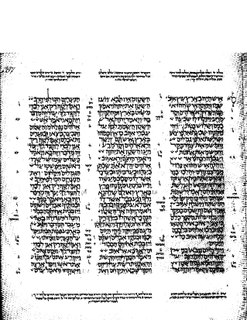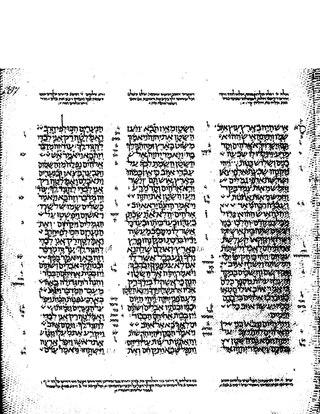
Job 42 is the 42nd chapter of the Book of Job in the Hebrew Bible or the Old Testament of the Christian Bible. The book is anonymous; most scholars believe it was written around 6th century BCE. The first part of this chapter belongs to the dialogue section of Job 32:1–42:6 and the second part is the epilogue of the book comprising Job 42:7–17.

Job 9 is the ninth chapter of the Book of Job in the Hebrew Bible or the Old Testament of the Christian Bible. The book is anonymous; most scholars believe it was written around 6th century BCE. This chapter records the speech of Job, which belongs to the Dialogue section of the book, comprising Job 3:1–31:40.

Job 5 is the fifth chapter of the Book of Job in the Hebrew Bible or the Old Testament of the Christian Bible. The book is anonymous; most scholars believe it was written around 6th century BCE. This chapter records the speech of Eliphaz the Temanite, which belongs to the Dialogue section of the book, comprising Job 3:1–31:40.

Job 4 is the fourth chapter of the Book of Job in the Hebrew Bible or the Old Testament of the Christian Bible. The book is anonymous; most scholars believe it was written around 6th century BCE. This chapter records the speech of Eliphaz the Temanite, which belongs to the Dialogue section of the book, comprising Job 3:1–31:40.

Job 6 is the sixth chapter of the Book of Job in the Hebrew Bible or the Old Testament of the Christian Bible. The book is anonymous; most scholars believe it was written around 6th century BCE. This chapter records the speech of Job, which belongs to the Dialogue section of the book, comprising Job 3:1–31:40.

Job 13 is the thirteenth chapter of the Book of Job in the Hebrew Bible or the Old Testament of the Christian Bible. The book is anonymous; most scholars believe it was written around 6th century BCE. This chapter records the speech of Job, which belongs to the Dialogue section of the book, comprising Job 3:1–31:40.

Job 8 is the eighth chapter of the Book of Job in the Hebrew Bible or the Old Testament of the Christian Bible. The book is anonymous; most scholars believe it was written around 6th century BCE. This chapter records the speech of Bildad, which belongs to the Dialogue section of the book, comprising Job 3:1–31:40.

Job 10 is the tenth chapter of the Book of Job in the Hebrew Bible or the Old Testament of the Christian Bible. The book is anonymous; most scholars believe it was written around 6th century BCE. This chapter records the speech of Job, which belongs to the Dialogue section of the book, comprising Job 3:1–31:40.

Job 16 is the sixteenth chapter of the Book of Job in the Hebrew Bible or the Old Testament of the Christian Bible. The book is anonymous; most scholars believe it was written around 6th century BCE. This chapter records the speech of Job, which belongs to the Dialogue section of the book, comprising Job 3:1–31:40.

Job 15 is the fifteenth chapter of the Book of Job in the Hebrew Bible or the Old Testament of the Christian Bible. The book is anonymous; most scholars believe it was written around 6th century BCE. This chapter records the speech of Eliphaz the Temanite, which belongs to the Dialogue section of the book, comprising Job 3:1–31:40.

Job 18 is the eighteenth chapter of the Book of Job in the Hebrew Bible or the Old Testament of the Christian Bible. The book is anonymous; most scholars believe it was written around 6th century BCE. This chapter records the speech of Bildad the Shuhite, which belongs to the Dialogue section of the book, comprising Job 3:1–31:40.

Job 19 is the nineteenth chapter of the Book of Job in the Hebrew Bible or the Old Testament of the Christian Bible. The book is anonymous; most scholars believe it was written around 6th century BCE. This chapter records the speech of Job, which belongs to the Dialogue section of the book, comprising Job 3:1–31:40.

Job 20 is the twentieth chapter of the Book of Job in the Hebrew Bible or the Old Testament of the Christian Bible. The book is anonymous; most scholars believe it was written around 6th century BCE. This chapter records the speech of Zophar the Naamathite, which belongs to the Dialogue section of the book, comprising Job 3:1–31:40.

Job 22 is the 22nd chapter of the Book of Job in the Hebrew Bible or the Old Testament of the Christian Bible. The book is anonymous; most scholars believe it was written around 6th century BCE. This chapter records the speech of Job, which belongs to the Dialogue section of the book, comprising Job 3:1–31:40.

Job 23 is the 23rd chapter of the Book of Job in the Hebrew Bible or the Old Testament of the Christian Bible. The book is anonymous; most scholars believe it was written around 6th century BCE. This chapter records the speech of Job, which belongs to the Dialogue section of the book, comprising Job 3:1–31:40.

Job 24 is the 24th chapter of the Book of Job in the Hebrew Bible or the Old Testament of the Christian Bible. The book is anonymous; most scholars believe it was written around 6th century BCE. This chapter records the speech of Job, which belongs to the Dialogue section of the book, comprising Job 3:1–31:40.

Job 25 is the 25th chapter of the Book of Job in the Hebrew Bible or the Old Testament of the Christian Bible. The book is anonymous; most scholars believe it was written around 6th century BCE. This chapter records the speech of Bildad the Shuhite, which belongs to the Dialogue section of the book, comprising Job 3:1–31:40.

Job 26 is the 26th chapter of the Book of Job in the Hebrew Bible or the Old Testament of the Christian Bible. The book is anonymous; most scholars believe it was written around 6th century BCE. This chapter records the speech of Job, which belongs to the Dialogue section of the book, comprising Job 3:1–31:40.

Job 27 is the 27th chapter of the Book of Job in the Hebrew Bible or the Old Testament of the Christian Bible. The book is anonymous; most scholars believe it was written around 6th century BCE. This chapter records the speech of Job, which belongs to the Dialogue section of the book, comprising Job 3:1–31:40.

Job 32 is the 32nd chapter of the Book of Job in the Hebrew Bible or the Old Testament of the Christian Bible. The book is anonymous; most scholars believe it was written around 6th century BCE. This chapter records the speech of Elihu, which belongs to the "Verdicts" section of the book, comprising Job 32:1–42:6.




